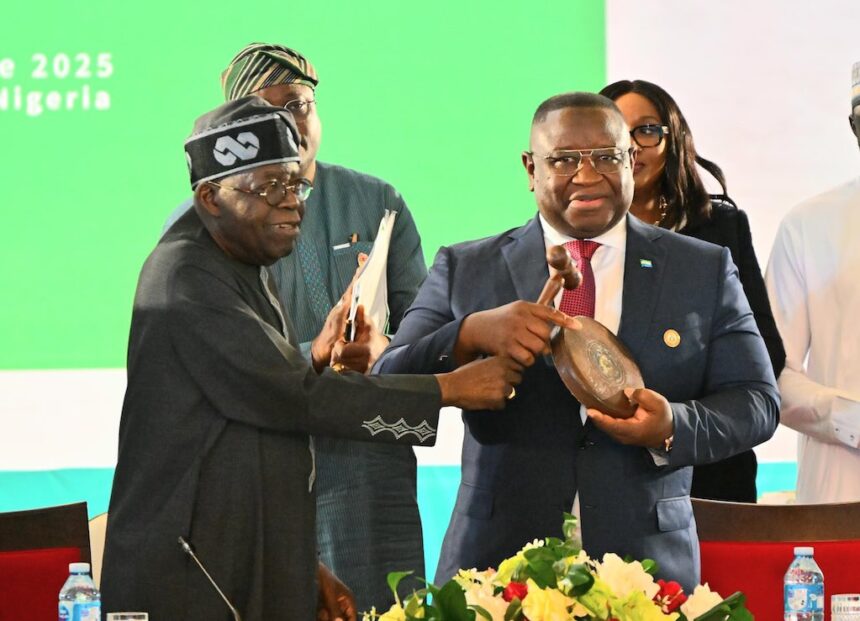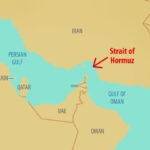Nigerian President Bola Tinubu’s ECOWAS tenure ended on Sunday after overseeing one of the most tumultuous reigns in the bloc’s 50-year history which saw the departure of three Sahelian member states from the regional body.
Recall the Economic Community of West African States (ECOWAS) under Tinubu’s watch was roiled as it tried without success to stop junta-led governments in Niger, Mali and Burkina Faso from quitting the bloc to form Alliance of Sahel States (AES), citing the threat of insecurity and jihadists which the three have in common among other reasons.
President Tinubu, at the ECOWAS Authority’s 67th Ordinary Session in Abuja Sunday, handed over the chairmanship of the ECOWAS Authority of Heads of State and Government to President Julius Maada Bio of Sierra Leone, who in fact had supported the use of military might to stop the Nigerien coup plotters in July 2023 and re-instate ousted President Mohamed Bazoum.
“As I now hand over the mantle of leadership to my great friend and dear brother, His Excellency President Julius Maada Bio of Sierra Leone, the new Chairman of the ECOWAS Authority of Heads of State and Government, I do so with a deep sense of fulfilment and optimism for the future of West Africa,” Tinubu said.
Tinubu, in his handover speech, reflected on the hydra-headed challenges currently faced by the bloc, something that his two-year tenure failed to curb as regional disintegration festered throughout his reign.
But still, he said: “Let us deepen cooperation, uphold diplomatic principles, and foster inclusive growth that leaves no one behind—especially our youth, women, and vulnerable populations, who remain central to the future of our region.
“Our organization must continue to strike a fine balance between its core regional mandate of economic integration and the complex political, security, and governance challenges, including preserving democratic values in our region.”
As Tinubu’s ECOWAS tenure ends, the Nigerian President also called for the speedy activation of the ECOWAS standby force to curb terrorism and transnational crimes in member states. “I am a little bit worried about the slow pace of its activation, which is taking longer than desired. The ECOWAS Standby Force must move from concept to operational reality”.
Hydra-headed Challenges for Sierra Leone’s Bio, New ECOWAS Chair
The new ECOWAS Chairman, President Bio, in his inaugural speech, promised to strengthen democracy and restore constitutional order in the region as well as unlock economic integration and opportunities for the region.
“The ECOWAS Trade Liberalisation Scheme, regional infrastructure, and cross-border value chains must become engines of job creation, trade, and resilience, especially for our women and youth.”
The Sierra Leonian President, who must first confront the pandora’s box of Jihadism and terrorism ravaging countries in the region acknowledged that “The democratic space is under strain in parts of our region. In some countries, the constitutional order has been disrupted.
“Yet, across West Africa, citizens—especially our youth—are demanding not just elections, but also accountability, transparency, and a fair stake in national life,” he said.
Despite his promises, Bio’s new position comes as the region faces its most severe crisis in decades with jihadist forces controlling vast swaths of the Sahel, a semi-arid region south of the Sahara; economic stagnation in the bloc’s countries including Sierria Leone led by the new ECOWAS chair; and democratic instability.
Bio’s tenure also kicks off as Ivorian President Alassane Quattara is being rumored to be seeking a fourth term in office while opposition parties in Ivory Coast continue to push back amid coup fears in the West African country.
Pan-Atlantic Kompass reports that as President Tinubu’s ECOWAS tenure ends, the Sahelian states of Niger, Mali and Burkina Faso, who jointly dumped the bloc under his watch, have since cut ties with their traditional Western allies, ousting French and American military forces as the junta leaders now look towards Russia and China for security and economic collaboration.





